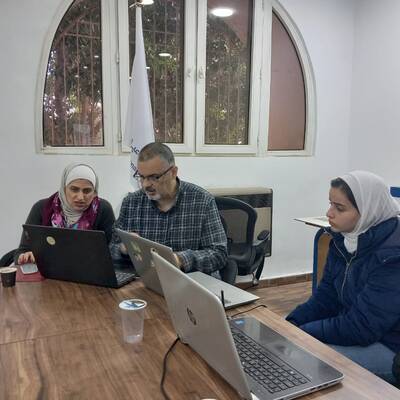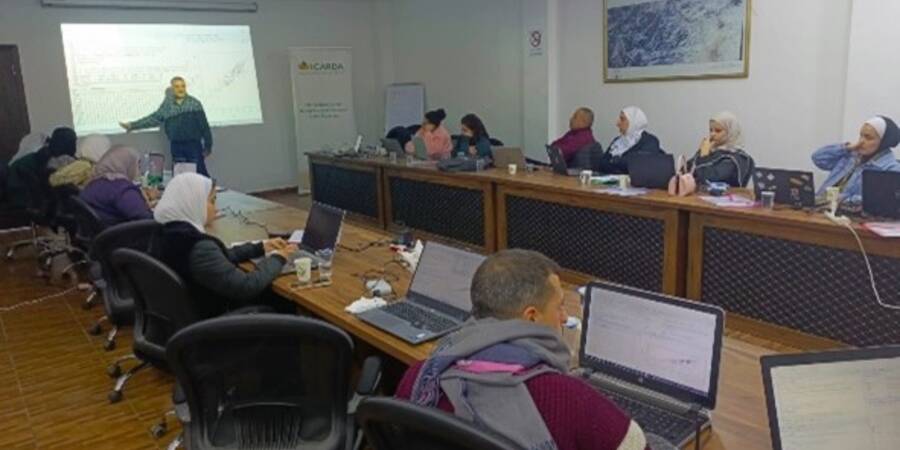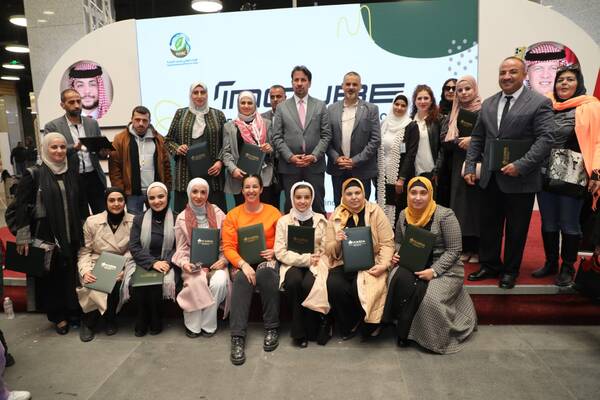Strengthening Genomic Research Capacity: Training on GWAS Analysis & Genomic Selection in Jordan

This training was organized by NARC Jordan and ICARDA and generously supported by the United States Agency for International Development (USAID) and the Arab Fund for Economic and Social Development (AFESD).
In collaboration with the National Agricultural Research Center (NARC) of Jordan, ICARDA conducted a five-day training workshop on Genome-Wide Association Studies (GWAS) Analysis and Genomic Selection (GS). This initiative addresses emerging needs for improved utilization of genetic resources stored within Jordan's national agricultural research system and reflects ICARDA’s commitment to empowering the next generation of scientists.
Training Overview
Dr. Nawal Alhajaj from NARC-Jordan initiated the training in response to discussions among stakeholders and partners, recognizing the need to equip young scientists and students with modern genomic tools that allow researchers faster analysis, management, and utilization of plant genetic diversity stored in genebanks.

The workshop brought together 20 participants - ten young scientists from NARC-Jordan and ten university students from Jordan. This diverse group ensured a robust knowledge exchange and perspectives, fostering collaboration between research institutions and academia.
ICARDA's Genetic Innovation team, in partnership with its Capacity Development Unit, has developed a comprehensive program to enhance technical expertise in genomic data manipulation within breeding programs. The students studied GWAS – a method used to identify genetic variants and, therefore, discover climate-smart traits, and GS – a modern breeding method that uses genomic information to predict the performance of the identified genetic traits.
Over five days, participants delved into topics such as Genomic Data Preprocessing (for manipulating SNPs/markers file and coding formats, filtering for data QA/QC, and imputation strategies) as well as techniques for associating genetic variants with phenotypic traits of interest (Genome-Wide Association Studies, GWAS) and advanced genomic prediction models to enhance breeding efficiency using genotypic markers data.
The training also introduced participants to cutting-edge tools, including ASRgenomics, statgenGWAS, and rrBLUP R packages, as well as the CGIAR Bioflow pipeline for breeding analytics, a state-of-the-art tool for quantitative genetic analysis, designed to guide and optimize decision-making in crop breeding operations. Field experiment techniques, such as spatial and partially replicated (P-Rep) designs, were also explored using the DiGGer R package. These tools enable researchers to understand the genetic basis of traits better, optimize breeding strategies, and apply predictive models to improve crop productivity. Ultimately, such advancements contribute to more efficient agricultural systems, helping to address global challenges like food security and climate resilience.
Tomorrow's Experts
The primary goal of the training was to strengthen the research capacity of young scientists and students in Jordan. By the end of the workshop, participants were expected to master the manipulation and preprocessing of genomic data, conduct GWAS and GS analyses using state-of-the-art R packages, and apply advanced breeding analytics and experimental designs through innovative pipelines and tools. Facilitated by Khaled Al-Shamaa, ICARDA’s Associate Scientist in Biometrics under the Genetic Innovation Program, the training seamlessly integrated theoretical knowledge with practical applications, offering a comprehensive and impactful learning experience.

Feedback from Participants
"The training course is highly beneficial, bridging plant breeding with biotechnology research by leveraging R-related libraries. It equips breeders with the tools to identify and apply methods for improving selection efficiency through GWAS analysis and genomic selection," said Dr. Amal Al-Khatib, Field Crop Researcher at the National Agricultural Research Center (NARC).
"This training is extremely beneficial for my research on selecting virus-resistant tomato lines. It has helped me identify significant markers associated with resistance traits, paving the way to discover the genes responsible for virus resistance," said Dr. Fatima Haj Ahmad, Assistant Professor in the Department of Agricultural Biotechnology at Al-Balqa Applied University.
Looking Ahead
This training marks a significant step toward building local capacity in genomic research in Jordan. By equipping participants with the latest cost-free and open-source tools and techniques, the initiative not only enhances their immediate research capabilities but also lays the foundation for long-term improvements in breeding programs.
The workshop demonstrates the power of collaboration in addressing critical agricultural challenges and underscores ICARDA’s commitment to fostering innovation and sustainability in dryland agriculture.

For more information about ICARDA’s capacity development initiatives, visit ICARDA's Website
--------------------



